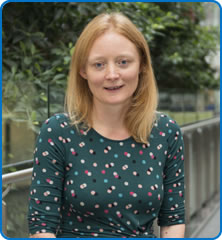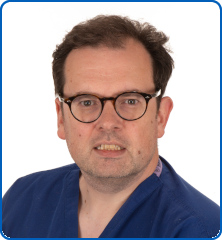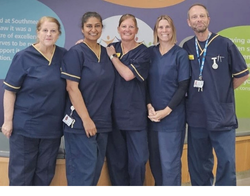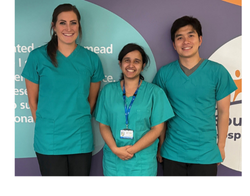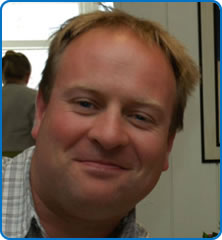Our Rheumatology Department is a multidisciplinary team consisting of Consultant Rheumatologists as well as Specialist Registrars training in Rheumatology, Specialist Pharmacists, Specialist Nurses, Physiotherapy & Occupational Therapists, Clinical Psychologists and Orthotics.
Consultant Rheumatologists
All our Consultant Rheumatologists are specialists in rheumatoid arthritis and other types of inflammatory arthritis.
Prof Emma Clark
General rheumatology and specialises in metabolic bone disease
Secretary – Jessica Goodwin – 0117 414 2849 – jessica.goodwin@nbt.nhs.uk
Dr Lynsey Clarke
General rheumatology and early inflammatory arthritis
Secretaries:
Southmead – Pamela Stone – 0117 414 2851 – pamela.stone@nbt.nhs.uk
Cossham – Caroline Reed – 0117 414 5140 – caroline.reed@nbt.nhs.uk
Dr Harsha Gunawardena
General Rheumatology and specialises Connective Tissue Diseases and vasculitis. NMSK Clinical Director North Bristol NHS Trust.
Secretaries:
Southmead – Pamela Stone – 0117 414 2851 – pamela.stone@nbt.nhs.uk
Cossham – Caroline Reed – 0117 414 5140 – caroline.reed@nbt.nhs.uk
Dr Philip Hamann (Clinical Lead)
General Rheumatology, Early Inflammatory Arthritis and digital healthcare.
Secretaries:
Southmead – Elizabeth Emery – 0117 4142850 – elizabeth.emery@nbt.nhs.uk
Cossham – Caroline Reed – 0117 4145140 – caroline.reed@nbt.nhs.uk
Dr Nicola Minaur
General Rheumatology and specialises in Young Adult care (transitioning from child to adult care) and musculoskeletal ultrasound.
Secretaries:
Southmead – Elizabeth Emery – 0117 414 2850 – elizabeth.emery@nbt.nhs.uk
Cossham – Caroline Reed – 0117 414 5140 – caroline.reed@nbt.nhs.uk
Dr Sam Patel
General Rheumatology and specialises in vasculitis and Behcet's Syndrome and acute medicine. Medical Director, North Bristol NHS Trust
Secretary – Sarah Thomas – 0117 414 1140 – sarah.thomas@nbt.nhs.uk
Dr John Pauling
General Rheumatology and specialises in Connective Tissue Diseases and vasculitis
Secretary:
Southmead – Pamela Stone – 0117 414 2851 – pamela.stone@nbt.nhs.uk
Dr Fang En Sin
General Rheumatology and specialises in vasculitis and giant cell arteritis (GCA)
Secretary - Wendy Parades Echevarria – 0117 414 2853 – wendy.paradesechevarria@nbt.nhs.uk
Dr Shalini Janagan
General rheumatology and specialises in metabolic bone disease, Young Adult rheumatology and connective tissue disease
Secretary:
Southmead –Jessica Goodwin - 0117 414 2849 – jessica.goodwin@nbt.nhs.uk
Dr Sarah Villar
General rheumatology and specialises in ankylosing spondylitis (AS) and giant cell arteritis (GCA)
Secretary:
Cossham – Caroline Reed – 0117 414 5140 – caroline.reed@nbt.nhs.uk
Specialist nurses
You may see the Rheumatology Nurses and Specialist Pharmacist in an outpatient appointment.
We have a nurse led rheumatology advice line which provides advice, support and information for patients in between hospital visits. We provide education about the disease process, medication, coping and self management, employment issues and injection technique. We can also coordinate with the wider multi-disciplinary team regarding any questions you may have.
We answer queries Monday to Friday excluding bank holidays. This is an answer machine service, please leave a message with your name, date of birth and contact number. We aim to return your call within 48 working hours but this may be longer during times of increased pressure.
- Alison Bayliss
- Felicity Ferris
- Elaine McCormack
- Wendy Rees
- Kreshma Summerhayes
Contact Rheumatology Advice Line: 0117 414 0600 (this is an answer machine service, please leave a message)
Email: rheumatologyadviceline@nbt.nhs.uk
If you need urgent advice out of hours then please call NHS 111
Administration Assistants
Harry Molton
Telephone: 0117 414 2838
Lynsey Vining
Specialist Pharmacists
- Emily Rose-Parfitt, Consultant Pharmacist
- Nidhimol Matthews, Specialist Pharmacist
- Ian Lau, Specialist Pharmacist
- Tom Dean, Specialist Pharmacist
Telephone Rheumatology Advice Line: 0117 414 0600 (this is an answer machine service, please leave a message.)
Email: rheumatologyadviceline@nbt.nhs.uk
Physiotherapists
We run specialist group classes for people with ankylosing spondylitis, osteoporosis and other inflammatory conditions, as well as tailor-made one-to-one physiotherapy treatments. We provide information and advice about your condition, teaching you what symptoms to expect and how to manage them. We guide you how to recognise and manage a flare, when to rest and when to exercise, and how to modify activities to protect your joints. We will teach you safe stretching and strengthening exercises, to increase movement and strength and maintain function. There is a rheumatology gym and a hydrotherapy pool at Level 1, Southmead Hospital Bristol.
- Rachel Lewis
- Georgia Smyth
- Charles sweet
- Jack Wetherbee
- Nicola Lewis
- Physiotherapy Technicians:
- Shane Griffiths
- Ana Puentes Rodriguez
- Telephone: 0117 414 4413
Occupational therapists
We provide advice and aids to enable you to participate fully in everyday life activities. We run group and one-to-one patient education sessions in self-management skills like joint protection, pacing, energy conservation, and relaxation. We provide a specialist splinting service for patients with upper limb problems.
Jenny Philpott – Lead Occupational Therapist - Rheumatology
Louise Clements – Specialist Occupational Therapist – Ortho Hands
Joanna Bartlett – Occupational Therapist
Hannah Woodrow – Occupational Therapist
Joanne Freeth – Occupational Therapy Assistant
Email: OccTherapy.Rheum@nbt.nhs.uk (we aim to return your query within 24 working hours)
If you do not have access to email and wish to talk to a member of our dedicated admin team you can call:
General Therapies Admin on 0117 413131 or
Occupational Therapy Admin on 07593 100286
Appointment related queries can be emailed to
YourOTAptChoice@nbt.nhs.uk
Clinical Psychology
Adjusting to an arthritis can be a challenge and may affect people emotionally at different times. Physical and emotional well-being are closely linked. If a person finds they are struggling emotionally, it may be useful to have some additional support from a Psychologist. This would be alongside the usual support from other members of the Rheumatology Team.
Psychologists can offer support with: self-management; coping with ongoing fatigue or pain; worries about taking medication; emotions that have become more of a problem, such as anxiety, low mood or anger; stress; relationship difficulties or work related difficulties. This might include thinking about other factors that might be impacting on physical and emotional well-being, such as bereavement or stress related concerns.
Dr Kate Druette, clinical psychologist
Dr Tijana Vranes, clinical psychologist
Dr Virginia Guy, counselling psychologist
Telephone: 0117 414 2855
Email: RheumatologyPsychology@nbt.nhs.uk

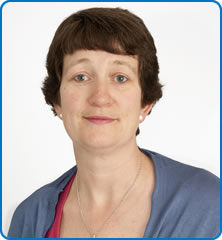 GMC Number:
GMC Number: 